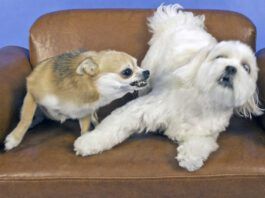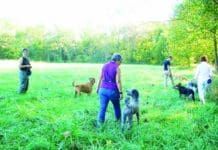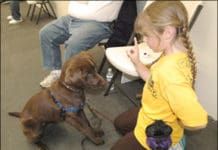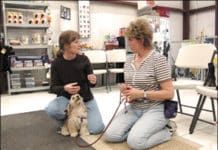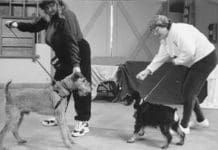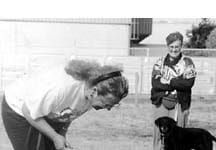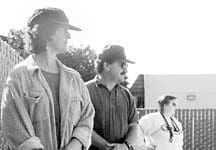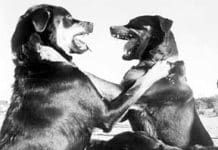Professional Dog Training Titles
Not to be outdone by the veterinary profession (See Alphabet Soup
Professional Dog Training in Your Home
a 3-year-old Labrador-mix
Been There, Doing That: Advice from Pro Dog Trainers
I think it’s really important for dog trainers to get a lot of experience being a student before becoming a teacher. Take as many classes as you can, in numerous disciplines, with your own dog. You’ll learn how different classes are structured and what you like and don’t like about them. When not actively working with your own dog, observe the other students and see how the instructor works with a variety of dogs and people.
Getting the Most Out of Puppy Kindergarten
You've got a new puppy and are about to start puppy classes (or are planning ahead for your new pup even better!). You know good puppy classes are an integral part of helping you and your dog invest in a long and harmonious future. Puppy classes aren't magic. Just signing up, paying, and attending aren't enough. You have to train and practice and build your relationship with your puppy. It will last a lifetime and the effort you put in now will pay off multifold. But keep in mind that the bad habits that you and your puppy develop now will also give you payback many times over! So let's assume you have really committed yourself to rearing a puppy well, and talk about how to get the most out of your puppy classes
How To Find The Best Dog Trainer For Your Dog
People have many questions when it comes to dog training: Lure-reward training or clicker training? Group classes or private lessons? Basic obedience or beyond? What type of trainer is best for dealing with your dog's behavior challenges? Finding the right trainer is an important piece of the training puzzle. Dog training is an unregulated industry; anyone can hang up a sign and instantly become a dog trainer. If you mix some decent Web-authoring skills with a college-level book on public relations, even yesterday's Fed-Ex clerk can have the Web presence of a seasoned dog training professional.
Canine Class for Aggressive and Problematic Dogs
the focus is on gradually teaching dogs new and more appropriate responses to increasingly proximate contact with other dogs. Pupils begin learning new skills behind visual barriers
A Guide to Choosing the Best Dog Trainer for You AND Your Dog
So, you’ve decided that you and your dog need professional help. Don’t worry; all relationships can use a helping hand at one point or another. Maybe the two of you have communication issues that need to be dealt with (like your dog doesn’t listen and you wish he would!). Or maybe your bouncing bundle of fur is growing faster and bigger than expected, and you’re desperate for a constructive outlet for all that energy and enthusiasm. You’re sure that training is the answer to your problems – and you are probably right!
Choosing the Right Dog Trainer
Dog training classes vary widely in style and quality of instruction. It is important to do research and make an informed choice before selecting a trainer. Before putting your dog’s future in a trainer’s hands, we recommend that you ask a lot of questions. First, though, you have to decide what you want from a training class. Class styles vary, with the two primary approaches being the military-style precision training traditionally used for showing in the obedience ring, and family dog classes that are more concerned with teaching canine good manners and social skills.
Canine Counselor
says Frost. This unconditional acceptance that dogs extend to us is one of the nicest perks that this special relationship offers us.
Another benefit we gain from our dogs is a sense of expansiveness and ease. People tend to be more open around animals, and dogs in particular. Frost notes, We are often more open
Training Classes for Aggressive Dogs
dog owners are taught to recognize behavioral signs of impending aggression




